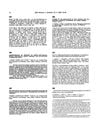Studies of the Modulation of MHC Antigen and Cell Adhesion Molecule Expression on Human Dermal Papilla Cells
August 1994
in “
Journal of dermatological science
”
linoleic acids palmitic acids sebocytes androgens testosterone dihydrotestosterone androgen receptor inhibitors active oxygen scavengers human dermal papilla cells cytokine-modulated regulation PPlase inhibitors cyclosporin A FK506 extracellular matrix growth factors fibronectin EGF TGF-B linoleic acid palmitic acid sebocytes androgens testosterone DHT androgen receptor inhibitors active oxygen scavengers dermal papilla cells cytokine regulation PPlase inhibitors cyclosporine tacrolimus extracellular matrix growth factors fibronectin epidermal growth factor transforming growth factor beta

TLDR Different substances affect hair and skin cell growth in various ways, with some promoting and others inhibiting cell proliferation.
The document from August 1, 1994, presents various studies on human and murine skin and hair follicle cells. One study found that linoleic acids significantly enhanced the proliferation of human sebocytes, which could suggest a role in comedo formation in acne, while palmitic acids reduced sebocyte proliferation. Another study showed that androgens like testosterone and dihydrotestosterone suppressed the proliferation of murine hair follicle-derived keratinocytes (HFK), an effect that could be abolished by androgen receptor inhibitors. Additionally, active oxygen scavengers were found to reverse the suppression of HFK proliferation by androgens. A study on human dermal papilla cells (DPC) revealed complex cytokine-modulated regulation of cell surface antigens, suggesting unique immunophenotypic characteristics of DPC. Immunosuppressive PPlase inhibitors like cyclosporin A and FK506 were found to induce hair growth in mice, suggesting a direct activation of hair-related cells rather than an immune system inactivation. Lastly, the effects of extracellular matrix and growth factors on DPC proliferation were examined, with fibronectin significantly accelerating DPC proliferation and EGF promoting growth in a concentration-dependent manner, while TGF-B inhibited DPC growth.




